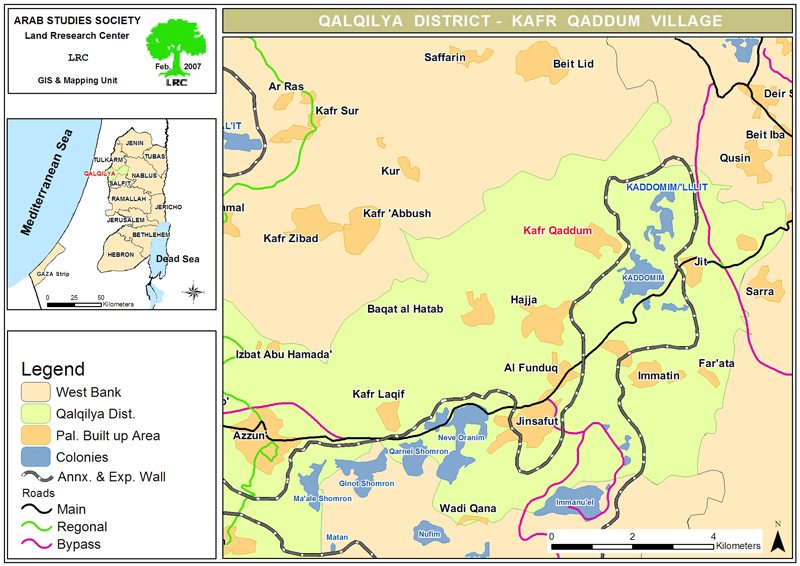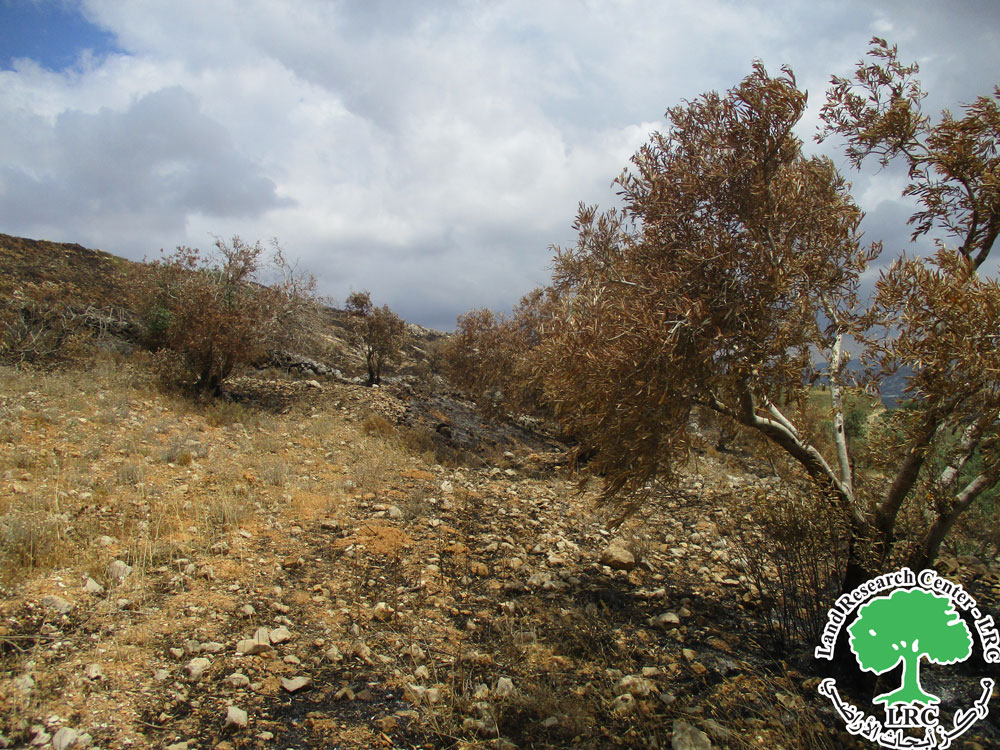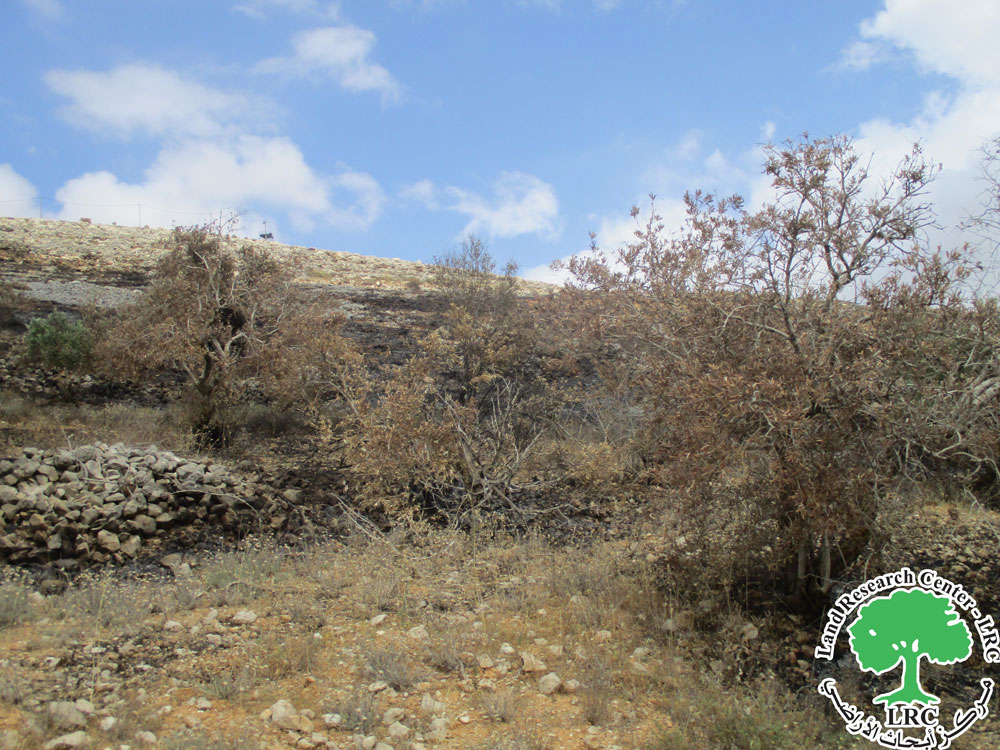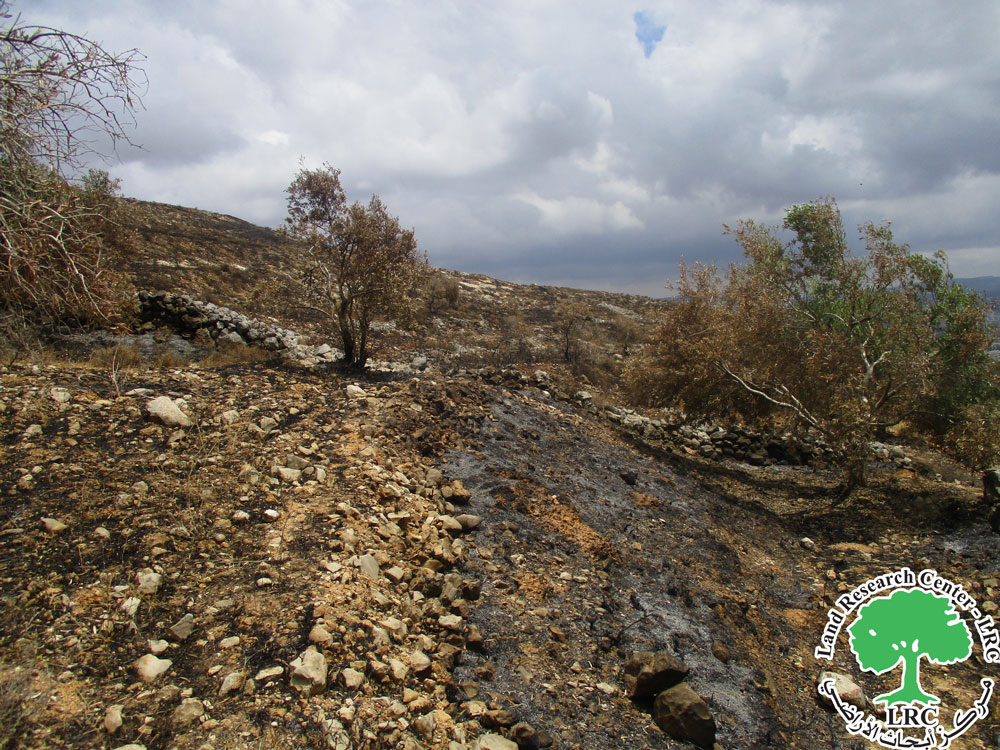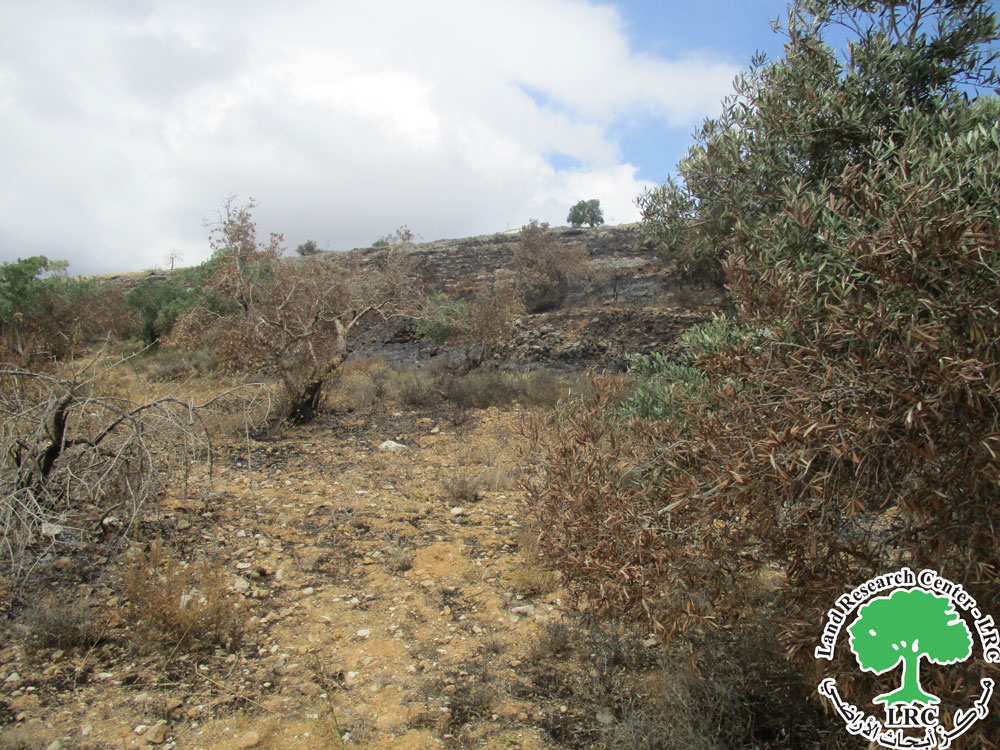Settlers of "Kadumim" Set Fire to Agricultural Land in Kafr Qaddum Village / Qalqilya Governorate
Violation: Burning of olive and thyme fields.
Location: Kafr Qaddum village, east of Qalqilya Governorate.
Date of Violation: 25/10/2024.
Perpetrators: Settlers from "Kadumim" settlement.
Affected Individuals: Farmers: Jamal Saleh Hassan Jumaa, Anas Abdul Razzaq Mahmoud Amer.
Description:
On the afternoon of Friday, October 25, 2024, a group of extremist settlers deliberately set fire to agricultural lands in Kafr Qaddum village, located to the east of Qalqilya city. The settlers targeted the olive fields during the ongoing olive harvest season for 2024.
It is noted that the fire spread, partially burning 25 olive trees in the "Khalayil Karam" area. The surrounding grass caught fire, exacerbating the spread and damaging the olive trees of farmer Jamal Saleh Hassan Jumaa.
Additionally, the fire also damaged 1.5 dunams of land planted with wild thyme, along with the destruction of 200 meters of irrigation pipes (quarter-inch diameter) in a neighboring plot of land in the "Al-Hasahis" area, owned by farmer Anas Abdul Razzaq Mahmoud Amer.
Names of the affected and the damage caused:
Impacted Farmer | Family member | Female number | Children number under 18 years | Nature of damage |
Jamal saleh hasan jumaa | 9 | 4 | 2 | The burning of 25 trees, 30 years old, with partial damage, which used to produce 12 tins of olive oil. |
Anas Abdulrazzaq Mahmoud Amer | 8 | 3 | 4 | Burning 1.5 dunams of thyme and 200 meters of irrigation networks, noting that the thyme produces 18,000 kilograms |
Total | 17 | 7 | 6 |
|
Farmer Anas Amer told the researcher from the LRC the following:
"I relied on farming as my source of income, as I lost my job within the Green Line, and I no longer have any other source of income. I planted a piece of land I own with thyme to provide for my children and family. The land is located 180 meters from the perimeter of the 'Kadumim' settlement, and the settlers took advantage of this to target the land and intentionally burn it entirely. The fire destroyed the entire plot, and now I have no source of income, nor do I have any work to support my family."
Mr. Mahdi Jumaa, Head of the Kafr Qaddum Village Council, stated:
"What is happening in terms of daily land confiscation, the burning of agricultural lands, and the closure of village lands reflects the extent of the suffering of the citizens and farmers. Most of the village's lands have been confiscated, and there is no area in the village that has not been affected by settlement and Judaization efforts. Even the edges of the 'Kadumim' settlement are now only a few meters away from the threatened houses of the village."
Kafr Qaddum Village:
Kafr Qaddum is located 25 kilometers from the city of Qalqilya. Its total area is 18,783 dunams, of which 456 dunams are for built-up areas. The village has a population of about 3,280 people, according to the Palestinian Central Bureau of Statistics in 2017. The following settlements are established on its land: Kadumim Tzion, Givat Harakiz, Kadumim Git. The village borders the northeastern side of Qalqilya, with the towns of Beit Lid to the north, Kafr Qaddum and Hajja to the west, and Jit and Qusin to the east. It is also surrounded by the settlements Kadumim, Givat Hamarkez, and Jit, and by the towns of Imatin and Hajja to the south.
1- Below are the names of the Israeli settlements and the areas of land they have seized from the village:
Name of Colony | Established year | Area of confiscated land/dunam | Number of colonists 2018 | Notes |
|
Givat Hamarkez | NA | 572 | NA | The entire settlement |
|
Jit | NA | 248 | NA | The entire settlement |
|
Kadumim | 1975 | 1006 | 4832 | The entire settlement |
|
Kadumim Tsefon | 1982 | 323 | NA | The entire settlement |
|
2- The two bypass roads, numbered 60 and 55, have also been seized, covering an area of 459 dunams.
3- The Apartheid Wall:
The planned route for the wall will seize 734 dunams of land and isolate 7,134 dunams (including all the settlements on the village's land). Its total length will be 7,344 meters.
Land Classification According to the Oslo Agreement for the Village:
- Area classified as A: NA dunams.
- Area classified as B: 8,385 dunams.
- Area classified as C: 10,398 dunams.
The Environmental Damage Caused by Settler Fires:
The colonial assault on agricultural land and property takes various forms, often causing harm not only to Palestinian citizens but also to the environment in which they live. One of these attacks is the setting of fires on agricultural lands and properties, which leads to the complete destruction of the agricultural ecosystem and the natural ecosystem in the area due to the spreading of fire. It also destroys the soil, disrupting the carbon balance, decreasing organic matter, and lowering microbial activity, which in turn reduces the soil's ability to retain water, preventing surface runoff due to the burning of trees.
Furthermore, the fires affect the pressure on the environment during the burn, causing air pollution. The fires also eliminate wild plants, preventing their regeneration.
Legal Commentary:
The Palestinian environment is generally subjected to numerous environmental violations by the Israeli occupation, blatantly disregarding all international and national laws and conventions related to the protection of environmental rights. The right to live in a clean and healthy environment is a fundamental human right since the beginning of creation. The occupation often attempts to present itself as concerned with international environmental issues, despite signing major agreements for environmental protection, such as the Basel Convention in 1989, the Rotterdam Convention in 2008, the Stockholm Convention in 2001, and the Ramsar Convention in 1971, as well as air quality and climate protocols. However, it continues to violate all these treaties without accountability or oversight.
In addition to the specific provisions regarding the right to enjoy a clean and healthy environment for those under military occupation, according to international laws, conventions, and treaties, such as the International Covenant on Economic, Social, and Cultural Rights under the United Nations General Assembly Resolution 2200 A (d-21) dated December 16, 1966, Article 1, paragraph 2: "...All peoples have the right to freely pursue their economic, social, and cultural development, and the right to freely dispose of their natural wealth and resources without prejudice to any obligations arising from international economic cooperation based on the principle of mutual benefit and international law. In no case may a people be deprived of its own means of subsistence..."
Undoubtedly, the actions taken by the Israeli side violate not only international laws but also the laws of the "occupying state." Referring to the details of this case, we find that the Israeli Penal Code of 1977 and its amendments state that any act of trespassing on others' property to commit a crime punishable by law, such as entering or remaining on property illegally, is subject to legal penalties. Article 447 states: "Anyone who does any of the following with the intention of intimidating the property owner, insulting, or harassing them, or committing a crime, shall be punished with imprisonment for two years: (1) entering or crossing the property; (2) staying on the property without legal right after entering legally.
(b) A crime is committed under this section if the perpetrator carries a firearm or a cold weapon, and the punishment is imprisonment for four years."
By examining this article, we find that the Israeli Penal Code criminalizes the mere act of entering someone else's property without permission for the purpose of intimidation, harassment, or insult, with a two-year sentence. The penalty increases when the perpetrator commits a crime on someone else's property using a weapon or a sharp object, or even through the destruction, burning, or sabotage of agricultural land, which is explicitly criminalized in the above-mentionfed article of the Israeli Penal Code.
Therefore, the Israeli aggressor violates not only the laws and treaties of "his state" but also international laws and conventions. It is necessary for the "Israeli judiciary" to hold the settlers accountable and punish them for these actions in accordance with their own laws. However, there is no legal accountability for the perpetrator within the Israeli judiciary. Nevertheless, this does not deny the right of any human being on this land to live in a clean, safe, and healthy environment free from any violation or assault.
[1] Source: Land Research Center.
مشروع: حماية الحقوق البيئية الفلسطينية في مناطق "ج" SPERAC IV - GFFO
Disclaimer: The views and opinions expressed in this report are those of Land Research Center and do not necessarily reflect the views or positions of the project donor; the Norwegian Refugee Council.
إخلاء المسؤولية: الآراء ووجهات النظر الواردة في هذا التقرير هي آراء ووجهات نظر مركز أبحاث الأراضي ولا تعكس بالضرورة وجهات نظر أو مواقف الجهة المانحة للمشروع؛ المجلس النرويجي. للاجئين
attached photos: aftermath the arson attack carried out by settlers in Kafr Qaddum village Land / Qalqilya
